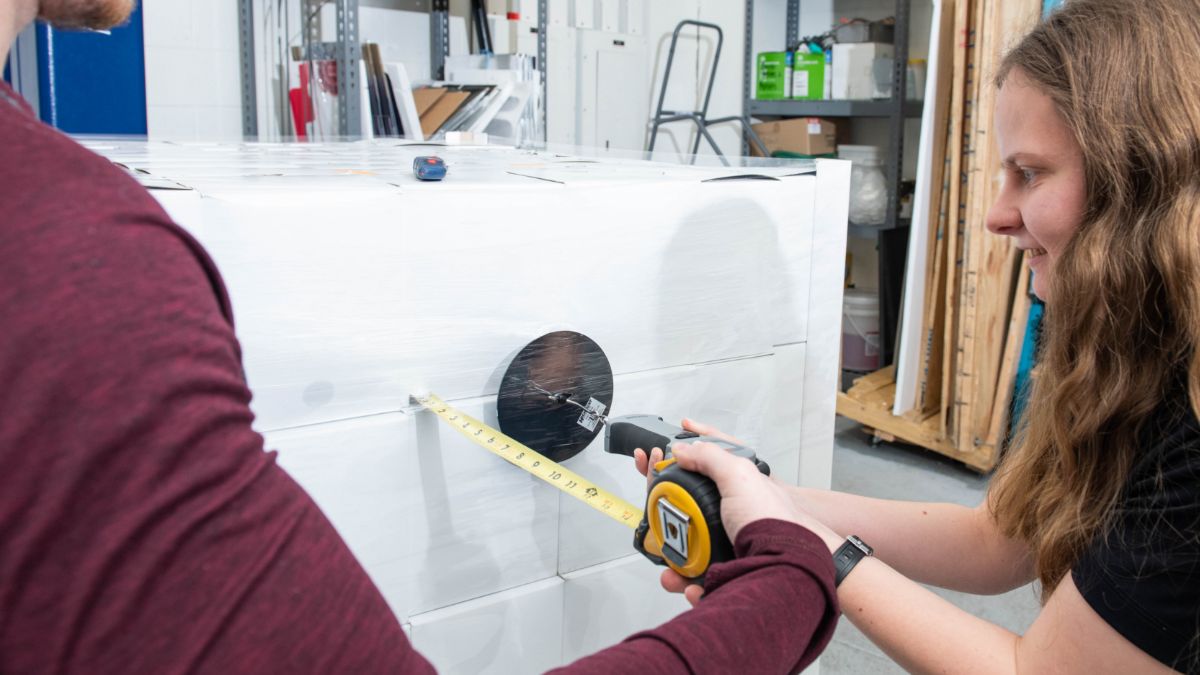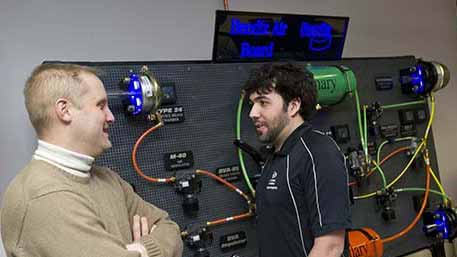Vibrations Advanced Certificate

Vibrations
Advanced Certificate
- RIT /
- Rochester Institute of Technology /
- Academics /
- Vibrations Adv. Cert.
Vibration engineering helps you control vibration in engineering systems and in everything from consumer product development and design, manufacturing, aerospace and automotive systems, and more.
Overview for Vibrations Adv. Cert.
Engineers with skills in vibration engineering contribute to creating manufacturing production systems, aerospace systems, automotive engineering, medical product development, consumer product development, and a host of industrial equipment and process systems in which vibration must be minimized or controlled.
The Impact of Machine Vibrations
Vibrations generated by machines and equipment can be disruptive and disturbing. Engineers often seek to reduce vibration so they can increase the durability and reliability of a machine, machinery system, or product; eliminate stress on a structure; and/or reduce damage, abnormal stoppage, or catastrophic failure. Targeted vibration prevention is the goal of a vibrations engineer.
Vibration Courses
The advanced certificate in vibrations takes you beyond the preparation in vibration engineering that you would typically complete during your undergraduate program of study. In this collection of graduate level courses, you will learn to use sophisticated software tools, analytical techniques and experimental methods to design, develop, and implement solutions for problems of vibration control and minimization in engineering systems. You will also be exposed to modern technologies used in industry to ensure that you are prepared for today's highly specialized job market. The curriculum answers a need for graduate-level instruction for practicing engineers in a field of importance for the 21st century.
What is a Graduate Certificate?
A graduate certificate, also called an advanced certificate, is a selection of up to five graduate level courses in a particular area of study. It can serve as a stand-alone credential that provides expertise in a specific topic that enhances your professional knowledge base, or it can serve as the entry point to a master's degree. Some students complete an advanced certificate and apply those credit hours later toward a master's degree.
Curriculum for 2025-2026 for Vibrations Adv. Cert.
Current Students: See Curriculum Requirements
Students are also interested in
Admissions and Financial Aid
This program is available on-campus only.
| Offered | Admit Term(s) | Application Deadline | STEM Designated |
|---|---|---|---|
| Part‑time | Fall or Spring | Rolling | No |
Part-time study is 1‑8 semester credit hours. RIT will not issue a student visa for advanced certificates.
Application Details
To be considered for admission to the Vibrations Adv. Cert. program, candidates must fulfill the following requirements:
- Complete an online graduate application.
- Submit copies of official transcript(s) (in English) of all previously completed undergraduate and graduate course work, including any transfer credit earned.
- Hold a baccalaureate degree (or US equivalent) from an accredited university or college. A minimum cumulative GPA of 3.0 (or equivalent) is recommended.
- Submit a current resume or curriculum vitae.
- Submit a personal statement of educational objectives.
- Letters of recommendation are optional.
- Entrance exam requirements: None
- Submit English language test scores (TOEFL, IELTS, PTE Academic, etc.), if required. Details are below.
English Language Test Scores
International applicants whose native language is not English must submit one of the following official English language test scores. Some international applicants may be considered for an English test requirement waiver.
Duolingo (DET): 120
IELTS: 6.5
LanguageCert Academic: 70
PTE Academic: 56
TOEFL: 79/4.5
International students below the minimum requirement may be considered for conditional admission. Deaf and hard-of-hearing test takers with significant hearing loss do not need to take the listening and speaking sections for the TOEFL and IELTS. Each program requires balanced sub-scores when determining an applicant’s need for additional English language courses.
How to Apply Start or Manage Your Application
Cost and Financial Aid
An RIT graduate degree is an investment with lifelong returns. Graduate tuition varies by degree, the number of credits taken per semester, and delivery method. View the general cost of attendance or estimate the cost of your graduate degree.
A combination of sources can help fund your graduate degree. Learn how to fund your degree
Accreditation
Contact
- Lindsay Lewis
- Senior Assistant Director
- Office of Graduate Admissions
- Enrollment Management
- 585‑475‑5532
- lslges@rit.edu
- Sarilyn Ivancic
- Graduate Program Director, Mechanical Engineering
- Department of Mechanical Engineering
- Kate Gleason College of Engineering
- 585‑475‑6003
- srieme@rit.edu
Department of Mechanical Engineering












